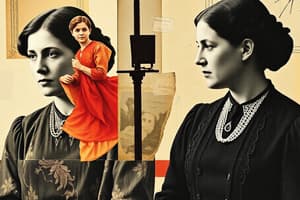Podcast
Questions and Answers
What was Frances Willard's perspective on religions?
What was Frances Willard's perspective on religions?
- She believed only Christianity held value.
- She found good in all religions. (correct)
- She rejected all forms of faith.
- She exclusively supported women's faith.
What controversial stance did Frances Willard take in her pursuit of suffrage?
What controversial stance did Frances Willard take in her pursuit of suffrage?
- She advocated for strict segregation.
- She publicly slandered black people. (correct)
- She ignored racial issues altogether.
- She empowered black women in the movement.
Which activity did Frances Willard take up in her fifties to challenge gender norms?
Which activity did Frances Willard take up in her fifties to challenge gender norms?
- Mountain climbing.
- Swimming competitively.
- Skydiving.
- Bicycling. (correct)
What was the title of Frances Willard's book that encouraged women to ride bicycles?
What was the title of Frances Willard's book that encouraged women to ride bicycles?
What was Frances Willard's ultimate vision for women?
What was Frances Willard's ultimate vision for women?
What motivated Frances Willard to leave her teaching position at Northwestern University?
What motivated Frances Willard to leave her teaching position at Northwestern University?
How did Frances Willard view suffrage?
How did Frances Willard view suffrage?
How many speeches did Frances Willard sometimes give in a year?
How many speeches did Frances Willard sometimes give in a year?
What role did Frances Willard hold in the Woman's Christian Temperance Union?
What role did Frances Willard hold in the Woman's Christian Temperance Union?
What common ground did suffragists find despite their differing religious backgrounds?
What common ground did suffragists find despite their differing religious backgrounds?
Which metaphor did Frances use to describe the suffrage fight?
Which metaphor did Frances use to describe the suffrage fight?
Which quality best characterized Frances Willard's personality in her activism?
Which quality best characterized Frances Willard's personality in her activism?
What was the position of some members within the WCTU towards engaging in politics?
What was the position of some members within the WCTU towards engaging in politics?
What were Frances Willard's childhood experiences that taught her about women's rights?
What were Frances Willard's childhood experiences that taught her about women's rights?
What event marked the beginning of Frances Willard's 'martyrdom'?
What event marked the beginning of Frances Willard's 'martyrdom'?
What was Frances Willard's view on women's education and employment?
What was Frances Willard's view on women's education and employment?
What is the main idea conveyed by the famous painting mentioned in the passage?
What is the main idea conveyed by the famous painting mentioned in the passage?
Which of the following phrases best describes Frances Willard's personality as a child?
Which of the following phrases best describes Frances Willard's personality as a child?
What is the significance of Frances Willard's statement, "The guns are ballots and the bullets are ideas."?
What is the significance of Frances Willard's statement, "The guns are ballots and the bullets are ideas."?
Why did Frances Willard's father disapprove of her becoming a teacher?
Why did Frances Willard's father disapprove of her becoming a teacher?
What was the main catalyst for Frances Willard's activism in the women's suffrage movement?
What was the main catalyst for Frances Willard's activism in the women's suffrage movement?
Flashcards
Frances Willard's belief on women's power
Frances Willard's belief on women's power
Frances Willard, a prominent figure in women's rights, famously believed that the power of ideas, like bullets, could shape society through the act of voting. This expression captured her vision of women's influence using their voices and principles to effect change.
Frances Willard's childhood
Frances Willard's childhood
As a child, Frances Willard was encouraged to play and learn alongside boys, breaking gender stereotypes and promoting equality. She became a tomboy, engaging in a variety of activities, developing skills, and emphasizing the importance of equal opportunities for children regardless of gender.
Frances Willard's 'martyrdom' at 16
Frances Willard's 'martyrdom' at 16
At sixteen, Frances Willard encountered societal expectations that forced her to adopt traditional female attire. This change from comfortable, practical clothing to restrictive, impractical garments symbolized the limitations placed upon women in that era, particularly in terms of their public image and freedom of movement.
Early Education & Public Speaking
Early Education & Public Speaking
Signup and view all the flashcards
Frances Willard's views on women's work
Frances Willard's views on women's work
Signup and view all the flashcards
Frances Willard's painting
Frances Willard's painting
Signup and view all the flashcards
Frances Willard's view on suffrage
Frances Willard's view on suffrage
Signup and view all the flashcards
Woman's Christian Temperance Union (WCTU)
Woman's Christian Temperance Union (WCTU)
Signup and view all the flashcards
Frances Willard's tactic
Frances Willard's tactic
Signup and view all the flashcards
Religious differences and suffrage
Religious differences and suffrage
Signup and view all the flashcards
Frances Willard's leadership
Frances Willard's leadership
Signup and view all the flashcards
Complexity of the suffrage movement
Complexity of the suffrage movement
Signup and view all the flashcards
Frances Willard on women in politics
Frances Willard on women in politics
Signup and view all the flashcards
WCTU and suffrage
WCTU and suffrage
Signup and view all the flashcards
Frances Willard on Women's Suffrage
Frances Willard on Women's Suffrage
Signup and view all the flashcards
Frances Willard on Women's Work
Frances Willard on Women's Work
Signup and view all the flashcards
Frances Willard on Bicycling for Women
Frances Willard on Bicycling for Women
Signup and view all the flashcards
Frances Willard's Racism
Frances Willard's Racism
Signup and view all the flashcards
Frances Willard's Unconventional Burial
Frances Willard's Unconventional Burial
Signup and view all the flashcards
Study Notes
Frances Willard: A Pioneer of Suffrage and Temperance
- Frances Willard was born in 1839 and died in 1898
- She grew up on a Wisconsin farm, experiencing a childhood steeped in freedom and resourcefulness
- She had a strong sense of equal rights, especially for women, from an early age
- She was a tomboy, engaging in activities typically associated with boys
- Willard was a public speaker and college professor, notably at Northwestern University
- She was a dedicated temperance advocate, actively campaigning against alcohol abuse
- Willard played a critical role in the Women's Christian Temperance Union (WCTU): she served as its president, impacting social action
- Her activism led to significant political engagement, with numerous public speeches
- Willard became deeply devoted to the suffrage movement, advocating for women's right to vote
- She saw women's suffrage as crucial for protecting the home and family
- She experienced criticism from other suffragists for some of her actions and views, notably concerning black people
- She was a leader in the early feminist movement despite personal experiences limiting women's access to education and career opportunities
- Frances Willard had a significant impact on women's rights in the 19th century, advocating for social change and equality
- This involved public speaking and engagement to improve the lives of women and children.
Willard's Education and Early Life
- Frances Willard received an education largely from her family and neighbors, including poetry and oral communication, until the age of eleven.
- She graduated from a women's college in Evanston, Illinois, in 1859.
- During childhood, her brother challenged her to walk across a pasture while holding a loaded shotgun, reflecting her resilience and determination.
Willard's Beliefs and Activities
- Frances Willard believed that women's education should be similar to men's and enable women to be fully independent
- She advocated for women's right to vote, framing it as essential for home protection
- She challenged convention by advocating for bicycling as a positive outlet for women
- Willard's activism extended beyond suffrage, encompassing temperance and other social issues
- She believed strongly in utilizing her public platform to promote her beliefs
- She challenged existing norms of female behavior in society and the idea of appropriate gender roles
Key Challenges and Criticisms
- Willard encountered opposition from within the suffrage movement for her views on race and social policy
- The suffrage movement faced varied approaches and beliefs, including from other suffragists, and conflicting opinions on some strategies and ideas.
Studying That Suits You
Use AI to generate personalized quizzes and flashcards to suit your learning preferences.




